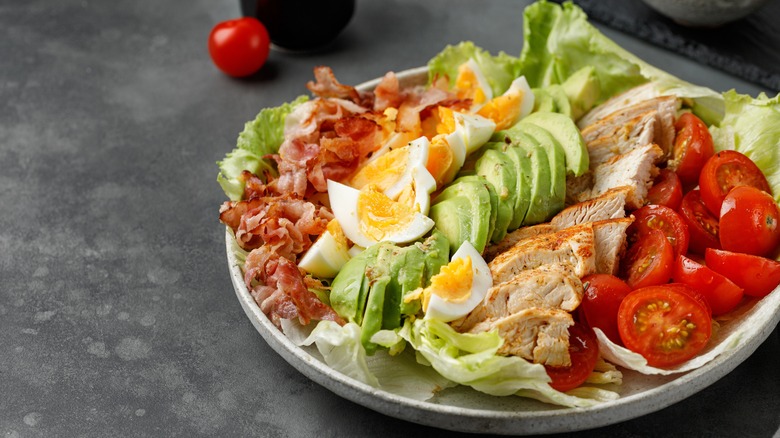Eating Salad Every Day Has An Unexpected Effect On Your Muscles
Salads are one of those dishes we equate with weight loss, healthy snacks, and useful nutrients like vitamins, minerals, fiber, calcium, folate, and phytonutrients. Dietitians might tell you to increase your leafy green intake to promote gut health, strengthen your immune system, and protect against heart disease, diabetes, and even cancer. What salads aren't typically linked with, though, is muscle strength. As it turns out, one particular nutrient found in leafy greens, nitrate, has an impact on muscle function, too. Per a 2021 study published in The Journal of Nutrition, higher dietary intake of nitrate, especially in the form of leafy greens, could be effective in boosting lower-limb muscle strength and physical function in men and women.
Nitrates are associated with improving cardiovascular function, brain health, and lowering the risk of age-related macular degeneration, in addition to increasing muscle function and strength and improving endurance time during exercise. Dietary nitrate is converted into nitric oxide when it enters your system, and nitric oxide improves blood flow by dilating your blood vessels. More blood flow overall means more blood flow to your muscles. "Nearly 80% of our dietary nitrate intake comes from vegetable consumption," shared medical toxicologist, co-medical director, and interim executive director at the National Capital Poison Center, Dr. Kelly Johnson-Arbor (via Medical News Today). But this isn't the only way salads help with muscle strength.
What you put in your salad matters
Making a satisfying salad that can also benefit your muscles is all about combining the right amount of protein, fiber, carbohydrates, and healthy fats. Nutritionist and weight loss expert Alan Aragon told Men's Health that proteins and carbs work in unison to boost muscle synthesis, while "fats support testosterone production, while also keeping you satisfied." Testosterone is a hormone associated with increased muscle mass and strength, as well as improved bone mineral density.
Additionally, a salad that has just the right amount of fruits could be great for your health. Adding some fruits to your salad could help because of the vitamin C content they provide. A 2020 study published in the Journal of Nutrition found that dietary vitamin C could help reduce age-related muscle loss. Be mindful of just how much you add, though, as having too much fruit in your diet can leave you with no room for other foods rich in muscle-building nutrients. With that said, adding protein-rich nuts like peanuts, almonds, cashews, pistachios, and walnuts can also elevate your salad game when it comes to muscle strength. Cheese, avocados, and eggs are other good additions.
What salads to make for muscle strength
Seattle chef Tom Douglas' amped-up version of the Cobb salad (via Men's Health) is a great choice for a nutritionally well-balanced salad, as it contains a generous helping of protein, carbs, and fats. You'll need some chopped romaine lettuce, a strip of bacon, a soft-boiled egg (chopped), 4 ounces of hanger steak (grilled and sliced), some cherry tomatoes, sliced avocado, blue cheese, a tangy tarragon, vinegar, garlic-based dressing, and some sugar snap peas (steamed and cut in half).
Another simple salad recipe you can try is the Mexican roasted corn and chicken salad, courtesy of The Xsport Life. You'll need some arugula and baby lettuce, cherry tomatoes (halved), pitted black olives, sliced radishes, some diced green onions, grilled corn, and grilled chicken breast slices topped with buttermilk, olive oil, grated parmesan, and herbs. You can also tweak these existing recipes by throwing in some vegetables that are higher in protein than meat, like spinach and edamame (but make sure to go easy on the salad dressing, if you plan to add some).


